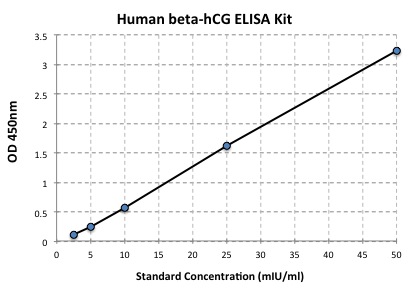More info
Human chorionic gonadotropin (hCG) is a hormone produced by the syncytiotrophoblast, a portion of the placenta following implantation. The presence of hCG is detected in pregnancy tests. Some cancerous tumors produce this hormone; therefore, elevated levels measured when the patient is not pregnant can lead to a cancer diagnosis. However, it is not known whether this production is a contributing cause or an effect of tumorigenesis. The pituitary analog of hCG, known as luteinizing hormone (LH), is produced in the pituitary gland of males and females of all ages. It is heterodimeric, with an α (alpha) subunit identical to that of luteinizing hormone (LH), follicle-stimulating hormone (FSH), thyroid-stimulating hormone (TSH), and β (beta) subunit that is unique to hCG.


